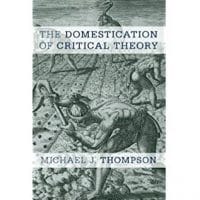-
“Yo Soy” (I Am): an act of visual rebellion by Victor Garcia
Garcia’s series highlights the imposition of racism as an insidious paradigm, defining who is, and what makes, an “American.”
-
The Domestication of Critical Theory – Michael J Thompson
What passes for Critical Theory today is nugatory; it is philosophically weak, and politically compromised. In Thompson’s words, the project has ‘abandoned the search for the real mechanisms and sources of social power’.
-
Review of River of Dark Dreams
This marvelous work of history is a must read for anyone trying to understand the dynamics of slavery in the United States in the pre-Civil War period. Walter Johnson locates slavery as playing a central part in the development of a particularly racialised and oppressive capitalism in the slave states.
-
A Party with Socialists in It
A history of the left in the Labour Party highlights the need for a strong extra-parliamentary movement, argues Chris Nineham.
-
Marronage meets Bolivarian Socialism: Maroon Comix, a Review
VA’s Jeanette Charles reviews Maroon Comix, a book that tells the tales of maroons’ fight for freedom and self-determination and their legacy for today’s struggles.
-
Is nuclear power a solution to the climate crisis?
Faith that environmental catastrophe can best be avoided by technological gadgetry rather than a change in social relationships received a big shot in the arm with the May 2018 publication of Energy: A Human History by prolific author Richard Rhodes. Rhodes profoundly misses the connection between technology and class relationships when he presents nuclear power as a socially neutral source of energy. Rather than pointing to a solution for climate change, his radiation denial mirrors Donald Trump’s climate denial in its derogation of scientific research and its personality attacks.
-
Climate change in the Anthropocene: an unstoppable drive to Hothouse Earth?
Leading Earth System scientists warn: “The Earth System may be approaching a planetary threshold that could lock in a continuing rapid pathway toward much hotter conditions.… Incremental linear changes to the present socioeconomic system are not enough to stabilize the Earth System.”
-
Science fiction and the angel of history
A review of, ‘Sorry to Bother You’.
-
Recommended reading from Mumia
The nation’s best known political prisoner, Mumia Abu Jamal, has high praise for historian Robin D.G. Kelly’s book Hammer and Hoe: Alabama Communists During the Depression.
-
Transformation problem unraveled
Moseley’s interpretation establishes the internal coherence of Marx’s theory, thereby creating a more solid basis for its further development on our own, Marxist, terms. Stated differently, there is no need to import unrealistic, abstract-ideal concepts from other economic theories in an attempt to “modernize” Marxist economics.
-
‘Corbynomics’ as fair and caring socialism
Karl Polanyi’s reciprocal, redistributive substantive-socialism; ‘Corbynomics’ as fair and caring socialism.
-
Tribute to Paul Sweezy: A rapid comment on the article A Marxist Correspondence
All those who like me have learned much from Paul Sweezy’s down-to-hearth, pragmatic but scientifically loyal Marxist approach will be delighted by Tom Mayer’s review of the book written by Nicholas Baran and John Bellamy Foster, editors, The Age of Monopoly Capital: Selected Correspondence of Paul A. Baran and Paul M. Sweezy, 1949–1964
-
Anthropocene Marxism
Thomas A. Laughlin reviews Marx and the Earth by John Bellamy Foster and Paul Burkett.
-
Marx at 200
A specter is haunting human affairs these days: it’s the thought that Karl Marx (on his 200th birthday this week) may have been more right than wrong about rich-get-richer bourgeois economics.
-
Engels and women’s oppression
What does Engels say about the root of women’s oppression? Is there validity to his argument today?
-
Zone of storms
In the five essays presented in October 1917, renowned radical political economist, Samir Amin, pushes far beyond the immediate necessity of emphasizing the historical weight of October, and launches, into an ambitiously broad analysis of the trajectory of twenty first-century socialism.
-
Dreaming of communism: News from Nowhere
There can be no denying that the content of News from Nowhere, the utopian romance penned by painter, poet and designer William Morris, was heavily indebted to the writings of Karl Marx. Morris was exploring these from the spring of 1882, the year before Marx died and the year of his own 48th birthday. He continued to read Marx, especially Capital, in its French edition, the first English edition being still a few years away.
-
Roxanne Dunbar-Ortiz, Loaded & Gregg Levine on Fukushima Daichi radiation
Roxanne Dunbar-Ortiz tells us about her new book, Loaded: A Disarming History of the Second Amendment.
Then we talk with journalist Gregg Levine about his special investigation for The Nation Magazine into the deaths and illnesses afflicting U.S. sailors exposed to radiation from the Fukushima Daichi meltdown. It’s titled “Seven Years on, Sailors Exposed to Fukushima Radiation Seek Their Day in Court.”
-
In defence of Metabolic Rift Theory
One Marxist line of inquiry into environmental problems has outshone all others in creativity and productivity: the theory of the metabolic rift.
-
A Review of The Young Karl Marx
The success of The Young Karl Marx derives from Peck’s ability to demonstrate the relevance of Marx for the present.




















